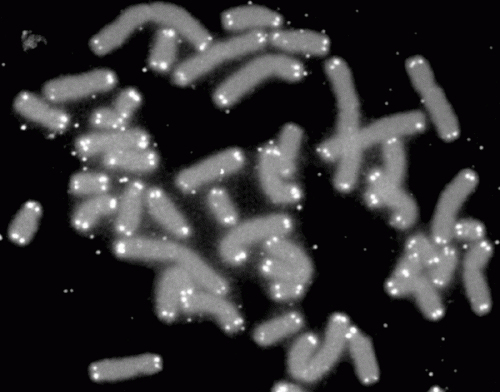February 23, 2016 report
Researchers find link between impatience and faster aging

A team of researchers with members from the U.S. and Singapore has found that young women who scored as more impatient on a common psychology test, tended to have shorter telomere length than their more patient peers. In their paper published in Proceedings of the National Academy of Sciences, the team describes the experiments they conducted, the testing they carried out and the results they found.
Leukocyte telomeres are caps on the ends of chromosomes, it is believed their purpose is to protect the chromosomes from damage—as cells divide, telomere length shortens—scientists believe this is one of the main reasons we age. As telomeres grow shorter, starting at around age 16, we grow older, until eventually the cells can no longer divide and our time runs out. In this new study, the researchers report that they have found what appears to be an external cause of telomere shortening, which could by extension mean, they have found a human trait that causes people to age faster.
The experiment consisted of enlisting the assistance of 1,158 Chinese undergraduate students (aged 21 to 22)—each was asked to participate in a common psychology experiment that involves giving participants a certain amount of money now, or more money at a later date. The experiment has been used as a means for measuring, among other things, the degree of patience a person has. After the psychology test, all of the students submitted to a medical procedure that involved taking blood samples and measuring the length of their telomeres. In comparing the result of the psychology test with telomere length, the researchers found a trend—female students who scored as impatient in the first test, were found to have on average shorter telomere length—there was no such connection with male students. The researchers suggest their data indicates that impatience was the cause of the shorter telomere length, but it is also possible that it works the other way around—those people with shorter telomeres are going to have a shorter life span, and thus they become impatient, somehow subconsciously knowing that they are going to have less time to live their life than their long-telomered peers.
More information: Onn-Siong Yim et al. Delay discounting, genetic sensitivity, and leukocyte telomere length, Proceedings of the National Academy of Sciences (2016). DOI: 10.1073/pnas.1514351113
Abstract
In a graying world, there is an increasing interest in correlates of aging, especially those found in early life. Leukocyte telomere length (LTL) is an emerging marker of aging at the cellular level, but little is known regarding its link with poor decision making that often entails being overly impatient. Here we investigate the relationship between LTL and the degree of impatience, which is measured in the laboratory using an incentivized delay discounting task. In a sample of 1,158 Han Chinese undergraduates, we observe that steeper delay discounting, indexing higher degree of impatience, is negatively associated with LTL. The relationship is robust after controlling for health-related variables, as well as risk attitude—another important determinant of decision making. LTL in females is more sensitive to impatience than in males. We then asked if genes possibly modulate the effect of impatient behavior on LTL. The oxytocin receptor gene (OXTR) polymorphism rs53576, which has figured prominently in investigations of social cognition and psychological resources, and the estrogen receptor β gene (ESR2) polymorphism rs2978381, one of two gonadal sex hormone genes, significantly mitigate the negative effect of impatience on cellular aging in females. The current results contribute to understanding the relationship between preferences in decision making, particularly impatience, and cellular aging, for the first time to our knowledge. Notably, oxytocin and estrogen receptor polymorphisms temper accelerated cellular aging in young females who tend to make impatient choices.
© 2016 Phys.org

















